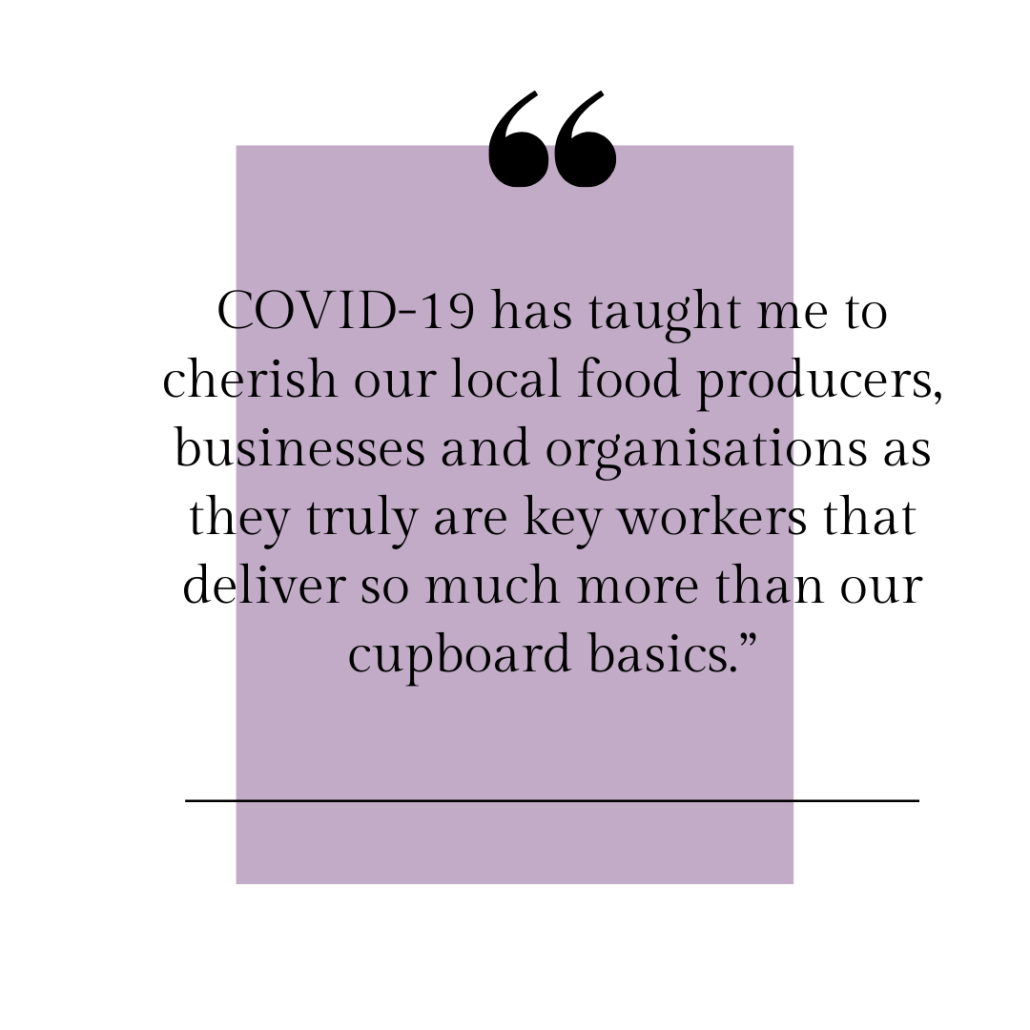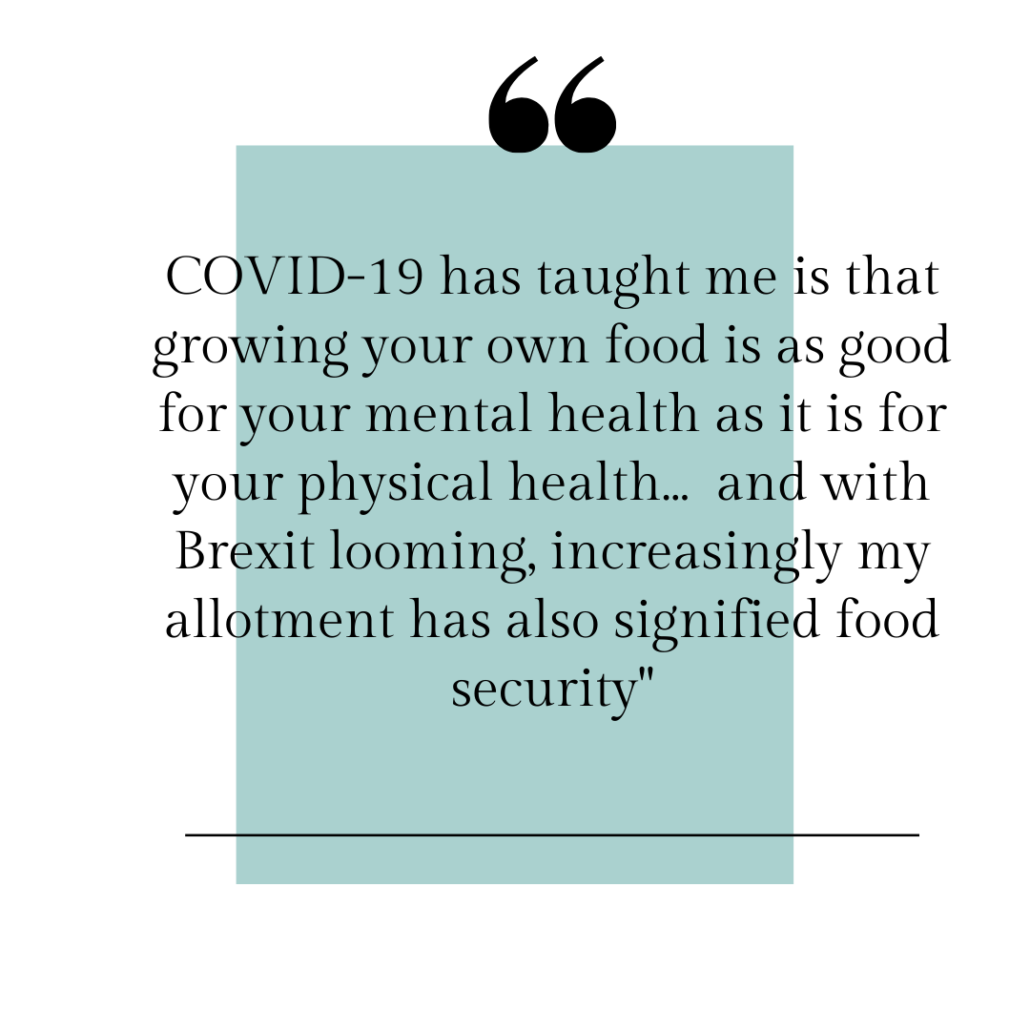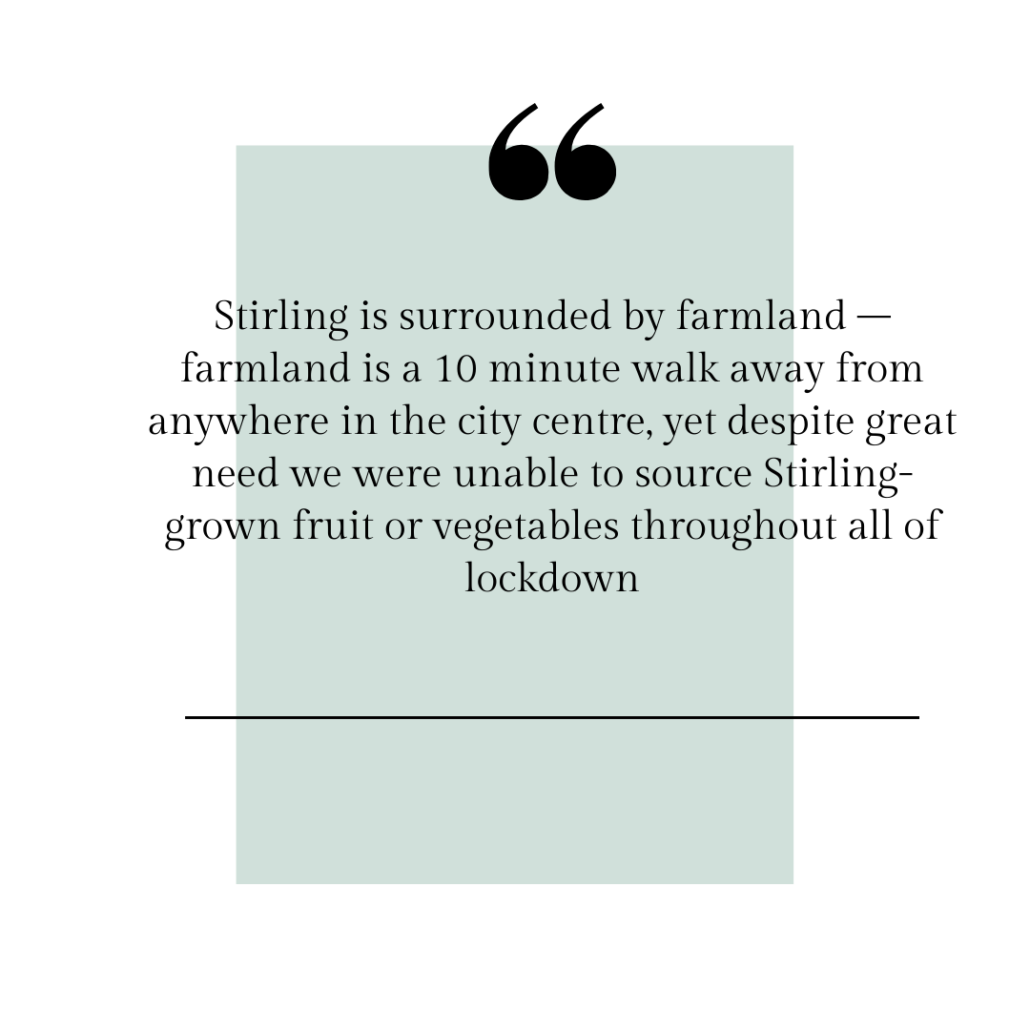This website uses cookies so that we can provide you with the best user experience possible. Cookie information is stored in your browser and performs functions such as recognising you when you return to our website and helping our team to understand which sections of the website you find most interesting and useful.
We asked Stephanie Mander, Senior Project Officer at Nourish Scotland and Co-ordinator of Scottish Food Coalition, to speak to WEAll about food insecurity and how it relates to Scotland’s wellbeing – both before and during the pandemic. Here’s what she had to say:
We’re fortunate to live in Scotland, a country where the leadership not only recognises the shortcomings of GDP as the measure of a country’s economic progress, but also actively seeks to position national success as directly tied to the wellbeing of the population.
Earlier this year, First Minister Nicola Sturgeon said, “Scotland is redefining what it means to be a successful nation by focusing on the broader wellbeing of the population as well as the GDP of the country. The goal and objective of all economic policy should be collective wellbeing… Putting wellbeing at the heart of our approach means we can focus on a wider set of measures which reflect on things like the health and happiness of citizens.”
This is an inspiring vision, and in line with the goals of the Scottish Food Coalition[1] – who would love nothing more than to see the health and happiness of Scotland’s citizens be the impetus behind the governance of our food system. Access to a healthy, sustainable diet is a human right, and that right is not being realised by too many in Scotland. We’ve been pushing for a proper look at the food system, and a bit of oomph behind the political will to address the many challenges it is facing – i.e. diet-related illnesses, food waste, climate change, biodiversity loss, food insecurity, neglect for workers’ rights and poor animal welfare.
Unfortunately, oomph has seldom characterised the Government’s work in this area. They have persisted with taking a siloed approach, trying to address these interconnected challenges in isolation. This has led to different Government departments creating separate and sometimes contradictory strategies according to disparate policy goals. Scottish Government has recognised that we need a more coherent, and joined-up approach, yet despite multiple commitments to a Bill to reform the food system (the Good Food Nation Bill), there have been years of delays, back-tracking, and watered-down policy commitments. Pressure from our Coalition, opposition parties, the public and many other stakeholders in the food system helped to bring the Bill back to the table.
The Bill was finally due to be introduced in Spring 2020 when the Government, understandably, took the decision to prioritise bills essential to coping with the pandemic. However, there remains a cruel irony that COVID-19 led to a delay in a Bill, which – as a result of the outbreak’s impact on our food system – is now needed more than ever.
–
Jobs: Food workers have suffered during this pandemic; those in the hospitality sector have taken a huge economic hit, with a higher proportion of furloughed staff (and expected redundancies) than any other profession. Additionally, they face great risk; workers in the food production and retail sectors have suffered some of the highest death rates from COVID-19.[2] Even before the pandemic, people working in the food and drink industry are amongst the most likely to face insecure employment; in-work poverty with zero-hours contracts is pervasive across the food sector.
Health: Diet-related illness have been definitively linked with vulnerability to COVID-19 – people with type 2 diabetes are 81% more likely to die from it. Obese people are 150% more likely to be admitted to intensive care, and severely obese people over 300% more likely. Even before the pandemic, poor diet was responsible for one in seven deaths in the UK – 90,000 a year – almost as fatal as smoking, which is responsible for 95,000 deaths a year.[3]
Food insecurity: In April 2020, the Food Foundation reported that in mid-April 2020, over 600,000 adults in Scotland were facing food insecurity.[4] This means that around 14% of the adult Scottish population are either skipping meals, having one meal a day, or being unable to eat for a whole day.[5] Prior to the pandemic, Scotland was seeing rising numbers of food insecurity: between April 2018 & September 2019, food banks in Scotland were giving out more than 1000 emergency food parcels on average every day.[6]
–
If current patterns continue, Trussell Trust has warned this could go up to food banks giving out six emergency food parcels per minute.[7] COVID–19 has not only worsened food security for those on low incomes; it has also created new vulnerabilities for people with previously secure incomes.
While arguments around resilience in our food chain hit new heights on the political agenda following this year’s well-publicised supply issues, the need for a new approach has never been more apparent.
The Scottish Government has prioritised wellbeing throughout its navigation of the COVID-19 pandemic – demonstrated by the £120 million investment to support people facing barriers to accessing food. But the underlying issues facing the food system existed before the pandemic; they are deeply entrenched. Stronger policy levers are desperately needed to galvanise systemic change.
However, this crisis has also shown what a new system could look like. We’ve seen some great stories of adaptation, and a renewed appreciation in the positive offerings of the food system. The pervasive disruption has jolted consumers into shifting their attitudes – with many thinking beyond their weekly supermarket shop. The pandemic has spurred a surge in demand for food boxes, community deliveries from local producers, and a perceived move to healthier and more sustainable buying. People are thinking more about where their food comes from.
We’ve been having conversations with people from across Scotland and hearing their thoughts on what the pandemic has revealed about our food system.
–
“Before COVID-19, Beach House Café in Portobello was a café we liked to visit. Since COVID-19, it has become our main grocery shop. A shop that knows our name, will flex to our diaries and work commitments and has shown us great care, energy, and commitment throughout. They are a shining example of what COVID-19 has taught me: cherish our local food producers, businesses, and organisations, as they truly are key workers that deliver so much more than our cupboard basics.”

We’ve seen communities come together, recognising that food is about more than calories – it’s about mental as well as physical wellbeing:
“I was so grateful for fresh fruit and some food each week from Blackhill’s growing group. I was having panic attacks at the thought of having to go to the shops…. standing 2 metres apart for 30/40 minutes just to get into the shop was pretty stressful for me. I am able to face shops a bit easier now. The friendly faces and chats from the folk delivering these food packages was also so appreciated.”
“What COVID-19 has taught me is that growing your own food is as good for your mental health as it is for your physical health… and with Brexit looming, increasingly my allotment has also signified food security.”

But there remains a recognition of the disconnect between the food system and the wellbeing of the population:
“Stirling is surrounded by farmland. Farmland is a 10-minute walk away from anywhere in the city centre – yet despite great need, we were unable to source Stirling-grown fruit or vegetables throughout all of lockdown.”

Frustratingly, there is not enough time before the next Scottish election to introduce the Good Food Nation Bill. But COVID-19 has shown us beyond a doubt that reform is needed.
The Scottish Food Coalition will continue to call for the introduction of the Good Food Nation Bill, with human rights at its heart.
More people are at the sharp end of systemic inequalities and inadequacies in our food system and the shortcomings in its governance. They should not have to continue to bear this burden. Legislators must learn lessons from COVID-19 that they have consistently failed to learn before this crisis. The Government must act now to ensure we realise our human right to food.
All we are saying is: give wellbeing a chance.
[1] The Scottish Food Coalitionis an alliance of small-scale farmers and growers, academics, workers’ unions, and charities focused on the environment, health, poverty, and animal welfare. The coalition has over 35 members including RSPB Scotland, WWF Scotland, STUC, UNISON Scotland, Unite, Nourish Scotland, Trussell Trust, Health and Social Care Alliance Scotland, Obesity Action Scotland, Scottish Care and Leith Crops in Pots. http://www.foodcoalition.scot
[2] https://www.nationalfoodstrategy.org/partone/
[3] ibid
[4] https://foodfoundation.org.uk/wp-content/uploads/2020/04/Report_COVID19FoodInsecurity-final.pdf
[5] ibid
[6] https://news.stv.tv/scotland/crisis-warning-as-1000-food-parcels-handed-out-every-day?top
[7] https://www.bigissue.com/latest/foodbanks-could-give-out-six-food-parcels-every-minute-this-winter/
the discussion?
Let us know what
you would like
to write about!

